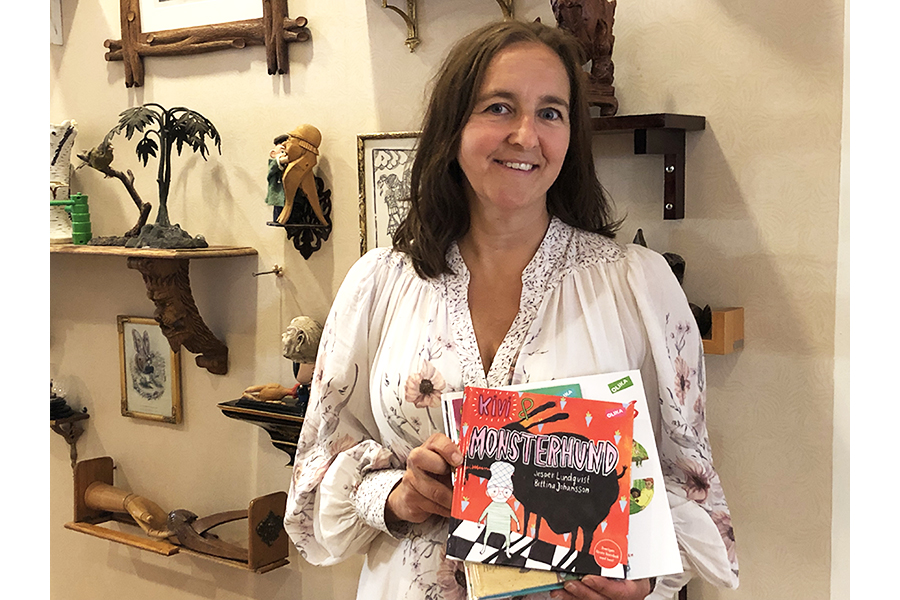Special assignment: PGN went to Stockholm for Pride and to learn about LGBTQ issues in Sweden.
After Marie Tomičić separated from her son’s father, the two made a typical Swedish parenting decision: joint custody, cycling the child between each household every other week.
But Tomičić ran into trouble when reading children’s books with her offspring. The only ones she could find featured a mom, dad and child living together under one roof.
“I just hated to read to him because the thing is, when you read, it’s like you mirror. When you never see yourself in those books, it does something to you because you’re not included in the world,” Tomičić said. “Something tells you your way of living is ‘outside,’ it’s not the normal way.”
Tomičić was inspired to launch Olika Publishing, a company that produces children’s books full of gender-neutral and inclusive characters that challenge gender norms. Created in 2007, Olika, which means “different” in Swedish, has released 150 children’s books for kids up to age 12.
The company aims to normalize characters that are LGBTQ, gender nonconforming or otherwise defying gender stereotypes by integrating them into its books without focusing the stories on their identities, Tomičić said.
In one book, “Kivi & the Monster Dog” the main character uses the gender-neutral Swedish pronoun “hen,” but the story focuses on a child adopting a dog for her birthday. Another, “We Wash the Car,” follows a family with lesbian parents washing their car, but the story doesn’t focus on the LGBTQ relationship.
“We have two moms washing the car together with this kid, but it doesn’t say anywhere that this is a book about two moms. It’s just a book about washing the car,” Tomičić said. “We normalize. We try to make the norm bigger so that what is previously seen as ‘different’ and ‘outside’ can come into the norms.”
Girl characters in literature and films are often portrayed as passive, emotional and careful, with reactions described as “upset,” “sad” or “torn apart,” Tomičić added. They are often seen playing at home and following rules. Alternatively, boy characters are written as active, strong and courageous, get “angry,” “irritated” or “frustrated” and are viewed as adventurous and playing outside.
When Olika started, studies of Swedish literature showed 70 percent of characters followed these traditional gender norms, according to Tomičić. Since then, the numbers have dropped to a 50-50 split in children’s books.
Olika isn’t alone in Swedish efforts aimed at child-rearing in a more gender-inclusive and identity-accepting way than other countries.
Stockholm resident Linda Wainwright Höckerfelt is a member of Proud Parents of LGBTQ People, an organization that supports parents and youth through the coming out process. Wainwright Höckerfelt’s 22-year-old son told her he was gay when he was 15.
“People put their kids in the closet,” she said. ”If you’re more open minded from the beginning, then they don’t have to come out. It’s, in general, more awareness of the community [in Sweden].”
Sweden’s first gender-neutral and inclusive preschool, Egalia, opened in 2010. Other schools followed suit, including many government-funded institutions. Teachers avoid using gendered pronouns, instead opting for “hen.” Offered books don’t contain gender stereotypes, and children are encouraged to pick any toy desired.
In a 2017 Global Early Adolescent Study, researchers from Johns Hopkins Bloomberg School of Public Health in Baltimore found gender stereotypes are typically established in adolescents across the globe by age 14. These norms result in consequences for girls including leaving school early, depression and increased risk of HIV and other sexually transmitted diseases, it indicates.
In Sweden, parents and teachers work to raise kids “more like human beings,” Wainwright Höckerfelt said. When her son was young, he wanted a stroller. So she bought him one.
He put his toy cars in it and pushed it around.
While efforts like this seem “basic,” Wainwright Höckerfelt said, allowing children to grow up authentically is as simple as offering kids options, like choosing from a “smorgasbord” of toys at daycare.
“Getting dressed up, trying different roles, being police if you’re a girl, princess if you’re a boy, there’s no way to fuss about that,” she added.
Tomičić told PGN she hopes to see Olika continue to grow and publish up to 40 books per year. Additionally, she’d like to see books offered to a wider-ranging age group.
“Sometimes, as we hear here, ‘Olika’ can be tricky, there’s a lot of fear,” Tomičić said. “You can always detect fear, and that is why we try to make Olika something positive. It’s not dangerous, it’s just different. We are different and that is OK, we can still live side by side.”

